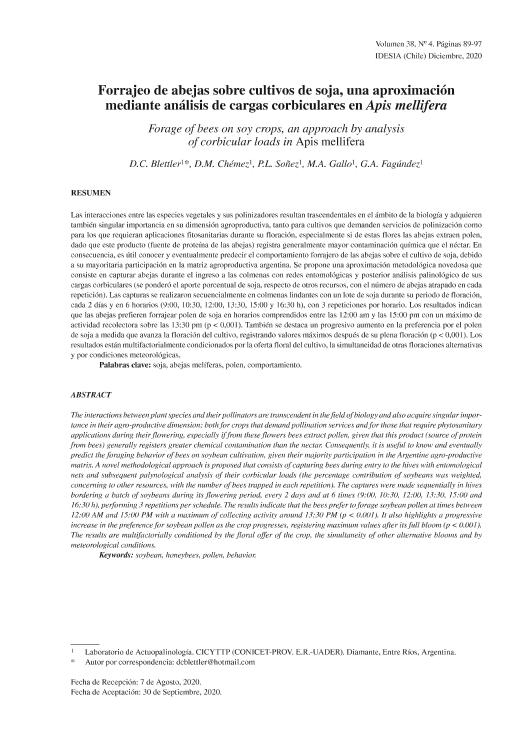Artículo
Las interacciones entre las especies vegetales y sus polinizadores resultan trascendentales en el ámbito de la biología y adquieren también singular importancia en su dimensión agroproductiva, tanto para cultivos que demanden servicios de polinización como para los que requieran aplicaciones fitosanitarias durante su floración, especialmente si de estas flores las abejas extraen polen, dado que este producto (fuente de proteína de las abejas) registra generalmente mayor contaminación química que el néctar. En consecuencia, es útil conocer y eventualmente predecir el comportamiento forrajero de las abejas sobre el cultivo de soja, debido a su mayoritaria participación en la matriz agroproductiva argentina. Se propone una aproximación metodológica novedosa que consiste en capturar abejas durante el ingreso a las colmenas con redes entomológicas y posterior análisis palinológico de sus cargas corbiculares (se ponderó el aporte porcentual de soja, respecto de otros recursos, con el número de abejas atrapado en cada repetición). Las capturas se realizaron secuencialmente en colmenas lindantes con un lote de soja durante su periodo de floración, cada 2 días y en 6 horarios (9:00, 10:30, 12:00, 13:30, 15:00 y 16:30 h), con 3 repeticiones por horario. Los resultados indican que las abejas prefieren forrajear polen de soja en horarios comprendidos entre las 12:00 am y las 15:00 pm con un máximo de actividad recolectora sobre las 13:30 pm (p < 0,001). También se destaca un progresivo aumento en la preferencia por el polen de soja a medida que avanza la floración del cultivo, registrando valores máximos después de su plena floración (p < 0,001). Los resultados están multifactorialmente condicionados por la oferta floral del cultivo, la simultaneidad de otras floraciones alternativas y por condiciones meteorológicas. The interactions between plant species and their pollinators are transcendent in the field of biology and also acquire singular importance in their agro-productive dimension; both for crops that demand pollination services and for those that require phytosanitary applications during their flowering, especially if from these flowers bees extract pollen, given that this product (source of protein from bees) generally registers greater chemical contamination than the nectar. Consequently, it is useful to know and eventually predict the foraging behavior of bees on soybean cultivation, given their majority participation in the Argentine agro-productive matrix. A novel methodological approach is proposed that consists of capturing bees during entry to the hives with entomological nets and subsequent palynological analysis of their corbicular loads (the percentage contribution of soybeans was weighted, concerning to other resources, with the number of bees trapped in each repetition). The captures were made sequentially in hives bordering a batch of soybeans during its flowering period, every 2 days and at 6 times (9:00, 10:30, 12:00, 13:30, 15:00 and 16:30 h), performing 3 repetitions per schedule. The results indicate that the bees prefer to forage soybean pollen at times between 12:00 AM and 15:00 PM with a maximum of collecting activity around 13:30 PM (p < 0.001). It also highlights a progressive increase in the preference for soybean pollen as the crop progresses, registering maximum values after its full bloom (p < 0.001). The results are multifactorially conditioned by the floral offer of the crop, the simultaneity of other alternative blooms and by meteorological conditions.
Forrajeo de abejas sobre cultivos de soja, una aproximación mediante análisis de cargas corbiculares en Apis mellifera
Título:
Forage of bees on soy crops, an approach by analysis of corbicular loads in Apis mellifera
Blettler, Diego César; Chemez, Daniela María; Soñez, Paola del Luján ; Gallo, Marcia Ayelen; Fagundez, Guillermina Andrea
; Gallo, Marcia Ayelen; Fagundez, Guillermina Andrea
 ; Gallo, Marcia Ayelen; Fagundez, Guillermina Andrea
; Gallo, Marcia Ayelen; Fagundez, Guillermina Andrea
Fecha de publicación:
12/2020
Editorial:
Universidad de Tarapacá
Revista:
Idesia
ISSN:
0718-3429
Idioma:
Español
Tipo de recurso:
Artículo publicado
Clasificación temática:
Resumen
Palabras clave:
Soja
,
Abejas melíferas
,
Polen
,
Comportamiento
Archivos asociados
Licencia
Identificadores
Colecciones
Articulos(CICYTTP)
Articulos de CENTRO DE INV.CIENT.Y TRANSFERENCIA TEC A LA PROD
Articulos de CENTRO DE INV.CIENT.Y TRANSFERENCIA TEC A LA PROD
Citación
Blettler, Diego César; Chemez, Daniela María; Soñez, Paola del Luján; Gallo, Marcia Ayelen; Fagundez, Guillermina Andrea; Forrajeo de abejas sobre cultivos de soja, una aproximación mediante análisis de cargas corbiculares en Apis mellifera; Universidad de Tarapacá; Idesia; 38; 12-2020; 89-97
Compartir



